| By Colin Hastings For more than four decades, the Dusit Thani Hotel was a personal beacon for me, literally and figuratively. This was particularly true in my earliest years here when Bangkok was an astonishingly flat city, its horizon not yet disfigured by the high-rises that dominate the place today. That’s something newcomers to Bangkok may find hard to accept, but it is a fact that as recently as 1974 the city had only two buildings that could be described as skyscrapers. One was the Dusit, the other a mysterious building on Sukhumvit rumoured to be run by the CIA. There was nothing mysterious about the Dusit. Thanks to its unusual conical shape it stood out on that flat horizon like a great big friendly Christmas tree. So if you were lost, you simply looked up and out, and the hotel’s glistening spire would help to point you in the right direction. Of course, the Dusit was much more than just a helpful landmark. It also performed all kinds of mini roles in many people’s lives, mine included, which probably explains why I feel a personal but possibly irrational sense of loss with its demise. |
When it opened in 1969, the Dusit Thani vied straightaway with the Oriental Hotel as the country’s finest purveyor of class and style; both were actually equal to any of Asia’s grand hotels. But whereas the Oriental was an international property, the Dusit played a different tune that highlighted the kingdom’s glorious culture and bringing it to the attention of a global audience. So much of it resonated with the unique Thai brand - the interior design and décor, the staff’s silk uniforms, the gentle tinkling of the khim.
When the highly influential Pacific Asia Travel Association came to town in 1983, accompanied by its hundreds of mostly American travel agents eager to find a new destination for their clients, the Dusit Thani was chosen as a one of the conference’s main hotels. Covering the event as a journalist, I recall the excitement of witnessing Thailand’s ‘discovery’ by the outside world. This nation was suddenly on the travel planners’ maps and from that year onwards, and the number of tourists to this country skyrocketed. There’s no question about it, the Dusit, with its incomparable Thainess and the charm of its staff, played a key part in this country’s hugely successful tourist industry.
During the years since, I’ve enjoyed numerous encounters with the Dusit. In my capacity as a writer and publisher, I have been extremely lucky to receive regular invitations from the hotel to try out new menus, interview VIPs and witness the launch of a new restaurant. In return, of course, I’ve written scores of stories about my Bangkok landmark.
For a while, I was also engaged as PR consultant and copywriter for the Dusit, producing supposedly enticing words to promote its various outlets. Many of those early advertisements were for the Tiara Supper Club, a top floor cabaret venue featuring acts by mostly overseas performers. One of those visiting acts was Gerry and the Pacemakers from the UK, a group that had peaked some years earlier but whose lead singer wasn’t enjoying the best of health at that time. To announce the show, the hotel installed a bill board in the lobby. Luckily, I wasn’t the one responsible for what was written on the board – Playing Tonight in the Tiara Supper Club - Gerry and His Pacemaker. Woops.
I also wrote ads for Bubbles, the pick of Bangkok’s discos in the 1980s. But like so many entertainment venues, Bubbles fell out of favor with the city’s party people and closed after a couple of years. It enjoyed a brief revival in 2018 with some of the former regulars returning to relive the past.
For the launch of Hamilton’s, the Dusit’s famous steakhouse, the hotel engaged an American chef who had apparently worked at the White House in Washington. To spice up the ad for the restaurant opening, I bent the truth a tad by writing that he was previously the US President’s personal chef. He never objected and business was good.
Numerous people held the position of general manager of the Dusit Thani over the past 50 years. One, whose total lack of protocol when greeting a VVIP, resulted in his instant dismissal, I seem to recall.
Two others, however, really stand out as great hoteliers and very decent people. A Swiss national by the name of Tony Tuor held the position many times on short contracts. Between stints, he became a lone sailor, seeking out distant lands. On one such trip he ended up in Tahiti where he quickly secured a job in a hotel for a few months before sailing back to Thailand and the GM job at the Dusit. He was clearly an exceptional operator for the hotel to happily agree have him in charge so many times.
Then there’s my old buddy Danny McCafferty, a wonderfully amiable Irishman of great wit who still lives in Bangkok. He helmed the Dusit brilliantly on two occasions for a total of 14 years.
Once I was invited to the hotel’s ‘back of house’, probably by Tony Tuor. It was an area rarely seen by outsiders. This is where the food is stored, prepared and cooked. Like all hotels, it was hidden in the bowels of the main building, a warren of neon-lit passages and small window-less offices. It buzzed with action, but totally lacked the grace and charm of the public areas. All hotels have their secrets. Frankly, I’d rather not to have known this one.
Another secret for many years was the floor space directly above the Tiara Club Supper Club. Set at the very peak of the main tower, it offered spectacular views across the city. For years, though, it was unoccupied. Eventually the hotel found a tenant for this facility when the Foreign Correspondent Club of Thailand (FCCT) moved in and began holding events there.
One of the club’s most memorable speakers was former Bangkok Post entertainment writer Bernard Trink, who shocked female members of the audience with his uninhibited opinions and experiences of the city’s raunchy nightlife. Many walked out in protest.
Not long after the FCCT also left, not because of Trink but to move into roomier and more appropriate premises in nearby Maneeya Centre. Some believed the move was also prompted by the lack of emergency exits atop the Dusit. They were probably right, given its single narrow staircase.
I have many more memories of the Dusit, but as wise folks say, it’s time to move on. In a few years a new Dusit will open and hopefully I’ll be among the first to enjoy it.
During the years since, I’ve enjoyed numerous encounters with the Dusit. In my capacity as a writer and publisher, I have been extremely lucky to receive regular invitations from the hotel to try out new menus, interview VIPs and witness the launch of a new restaurant. In return, of course, I’ve written scores of stories about my Bangkok landmark.
For a while, I was also engaged as PR consultant and copywriter for the Dusit, producing supposedly enticing words to promote its various outlets. Many of those early advertisements were for the Tiara Supper Club, a top floor cabaret venue featuring acts by mostly overseas performers. One of those visiting acts was Gerry and the Pacemakers from the UK, a group that had peaked some years earlier but whose lead singer wasn’t enjoying the best of health at that time. To announce the show, the hotel installed a bill board in the lobby. Luckily, I wasn’t the one responsible for what was written on the board – Playing Tonight in the Tiara Supper Club - Gerry and His Pacemaker. Woops.
I also wrote ads for Bubbles, the pick of Bangkok’s discos in the 1980s. But like so many entertainment venues, Bubbles fell out of favor with the city’s party people and closed after a couple of years. It enjoyed a brief revival in 2018 with some of the former regulars returning to relive the past.
For the launch of Hamilton’s, the Dusit’s famous steakhouse, the hotel engaged an American chef who had apparently worked at the White House in Washington. To spice up the ad for the restaurant opening, I bent the truth a tad by writing that he was previously the US President’s personal chef. He never objected and business was good.
Numerous people held the position of general manager of the Dusit Thani over the past 50 years. One, whose total lack of protocol when greeting a VVIP, resulted in his instant dismissal, I seem to recall.
Two others, however, really stand out as great hoteliers and very decent people. A Swiss national by the name of Tony Tuor held the position many times on short contracts. Between stints, he became a lone sailor, seeking out distant lands. On one such trip he ended up in Tahiti where he quickly secured a job in a hotel for a few months before sailing back to Thailand and the GM job at the Dusit. He was clearly an exceptional operator for the hotel to happily agree have him in charge so many times.
Then there’s my old buddy Danny McCafferty, a wonderfully amiable Irishman of great wit who still lives in Bangkok. He helmed the Dusit brilliantly on two occasions for a total of 14 years.
Once I was invited to the hotel’s ‘back of house’, probably by Tony Tuor. It was an area rarely seen by outsiders. This is where the food is stored, prepared and cooked. Like all hotels, it was hidden in the bowels of the main building, a warren of neon-lit passages and small window-less offices. It buzzed with action, but totally lacked the grace and charm of the public areas. All hotels have their secrets. Frankly, I’d rather not to have known this one.
Another secret for many years was the floor space directly above the Tiara Club Supper Club. Set at the very peak of the main tower, it offered spectacular views across the city. For years, though, it was unoccupied. Eventually the hotel found a tenant for this facility when the Foreign Correspondent Club of Thailand (FCCT) moved in and began holding events there.
One of the club’s most memorable speakers was former Bangkok Post entertainment writer Bernard Trink, who shocked female members of the audience with his uninhibited opinions and experiences of the city’s raunchy nightlife. Many walked out in protest.
Not long after the FCCT also left, not because of Trink but to move into roomier and more appropriate premises in nearby Maneeya Centre. Some believed the move was also prompted by the lack of emergency exits atop the Dusit. They were probably right, given its single narrow staircase.
I have many more memories of the Dusit, but as wise folks say, it’s time to move on. In a few years a new Dusit will open and hopefully I’ll be among the first to enjoy it.

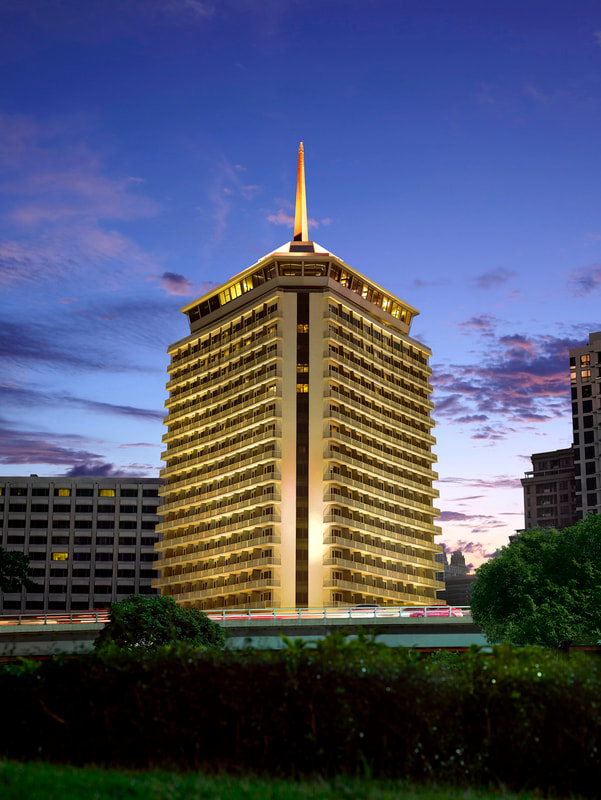
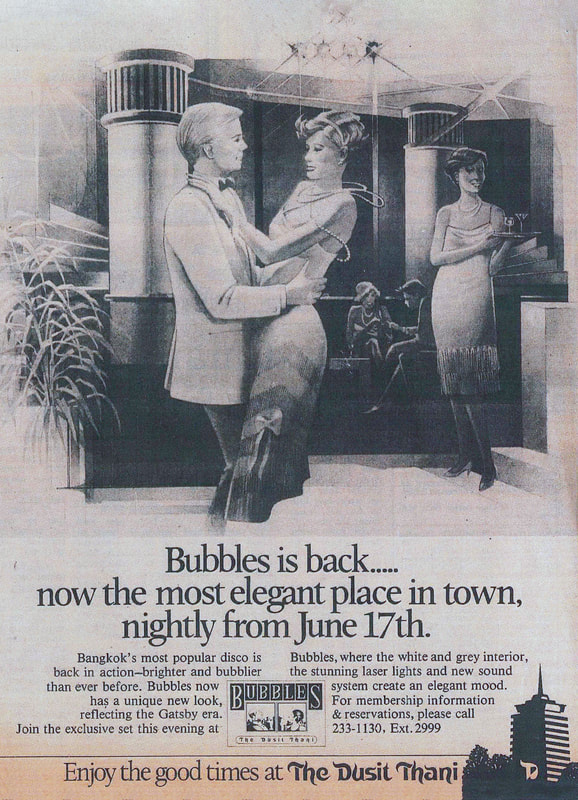
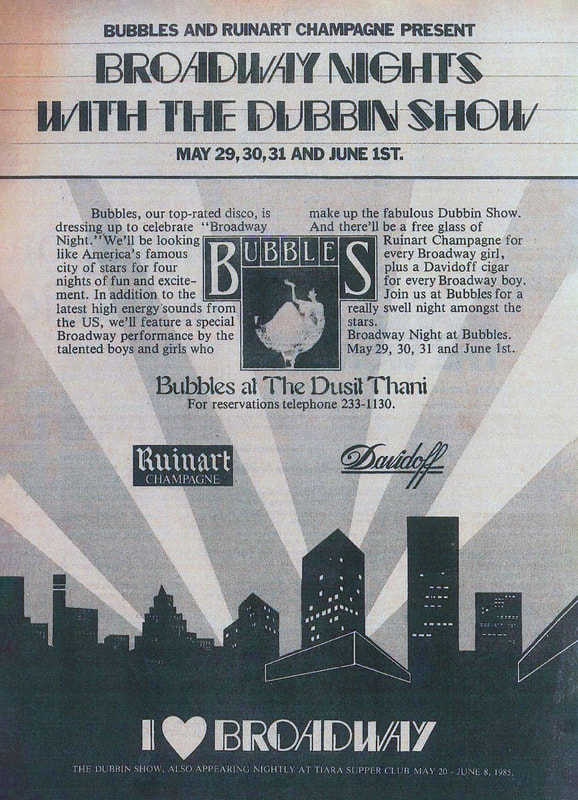
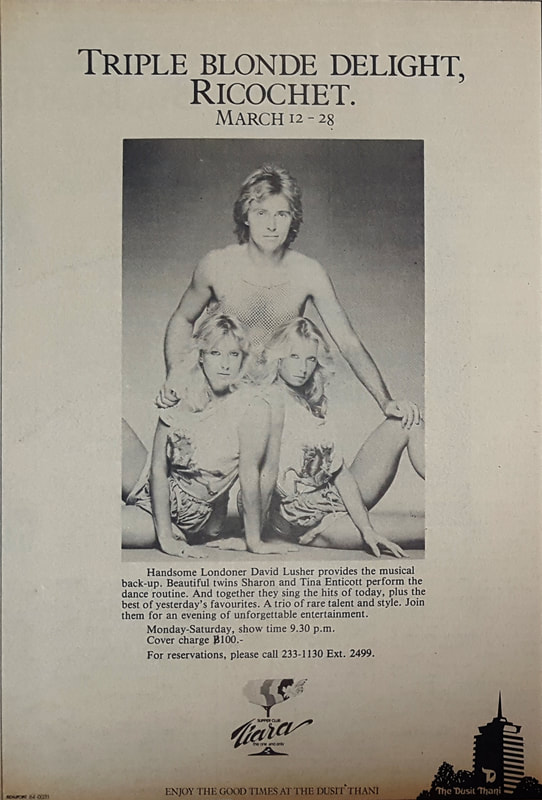
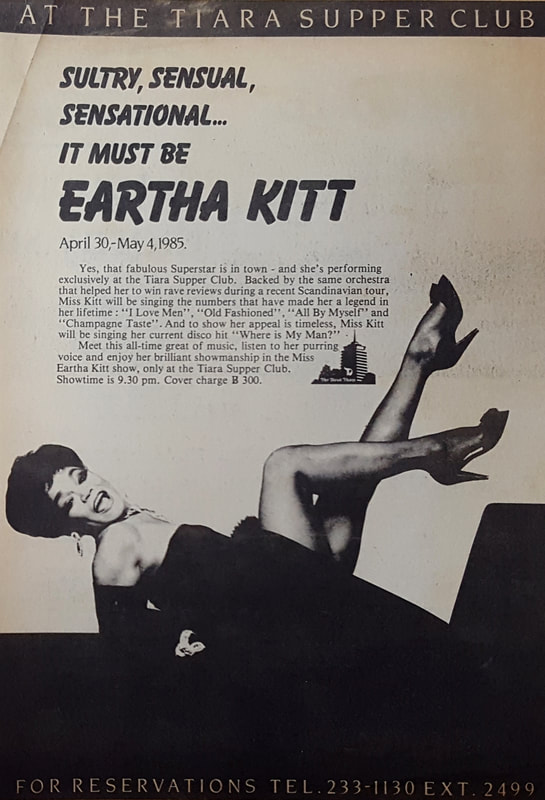
 RSS Feed
RSS Feed
















